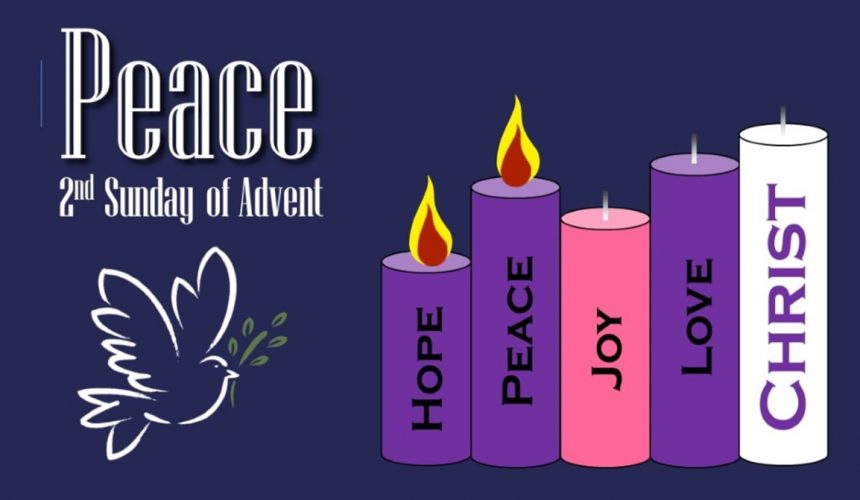2nd Sunday in ADVENT 5th December 2021
THEMES:
Peace
The Old Testament looked expectantly for The Advent of God’s forever king, the anointed one who would bring peace to his people. Isaiah 9:6 anticipates and declares, “For unto us a Child is born, unto us a Son is given; And the government will be upon His shoulder. And His name will be called Wonderful, Counsellor, Mighty God, Everlasting Father, Prince of Peace.”
Peace: Biblical peace means to make complete or to restore to a state of wholeness. The Advent of Jesus is the arrival of peace. He not only made peace with God for us, but he became our peace. Through The Advent of Jesus, not only are we no longer in conflict with God, but much more God has restored us to a state of wholeness.
PEACE ON EARTH: Let’s focus on what the angels said as they praised God in the night sky. God’s glory is magnificent and manifold—the angels could have sung about a hundred different attributes of God. So in this divine birth announcement, what are they choosing to focus on?
Suspended in mid-air, the angels first focus upward, where God is reigning high above the earth: “Glory to God in the highest heaven.” The next line, “And peace on earth to the people He favours,” brings us down the fields where the shepherds stand.
There is a huge distance between “highest heaven” and “earth”—but it is a distance that Jesus had bridged that night, stepping down from Heaven to be born as a human baby.
Why? To bring “peace on earth.”
Jesus is God, eternal and all-knowing and all-powerful and all-present. But at Christmas, Jesus was born as a human baby. He became fully human and fully God, because only as both human and God could he be the perfect mediator to bridge the divide between heaven and earth and bring peace between God and humanity.
Just as John the Baptist was attentive to the voice of God in the wilderness, we are called to listened to God’s voice in our hearts and seek God’s purpose.
Being a baptised people means that we are attentive to God’s voice and calls in our hearts so we can live harmoniously.
This second week of Advent we focus on John the Baptiser, but specifically on his message, which was for the people to “Prepare the way”. Advent always calls out words like “waiting” and “preparation,” and they are important words because, in our instant world, we are not good at practising them. Too much of our lives are spent in reaction to events, people, ideas, and circumstances. Too much of our time is filled with busyness and noise. It is hard to slow down, to listen, to wait, to prepare thoroughly for anything, let alone God’s coming. Yet, John’s message remains true – God is coming to us, and we need to prepare our hearts, and make a way into our lives for God to enter in.
Many spiritual teachers through the centuries have recommended silence and stillness as a way to prepare. These are good habits to nurture, but for many of us, our fast-paced lives make it very difficult to carve out time to be still and silent. For this reason, it is important that we also learn to do the work of preparation within the activities of our lives. When we can slow our minds and hearts down in the midst of conflict, we can find more helpful ways to communicate and find solutions. When we can slow down and prepare well for projects, events and people, we can ensure that we don’t have to repeat work that wasn’t done properly, or we can ensure that we have the necessary resources at our disposal.
Preparation is a big subject, and one that is crucial for our spiritual health. This will be the focus of our meditations this week.
It’s fascinating to see how Luke begins this section. He starts by listing all the important people who held power in the world – politicians, kings and religious leaders. If God were going to speak, most people would assume it would have been to one of these important “movers-and-shakers”. But that’s not what happens.
God bypasses all of these people of power and God’s Word comes to an unknown stranger, living in the wilderness. Right from the start God’s saving work subverts human systems of wealth, power and status. But, in God’s purposes, John is no accident. Luke refers back to a prophesy of Isaiah and applies it to John. Like all prophecy this is probably a case of different layers of meaning – one for Isaiah’s time and one for Luke’s. The message, though, is clear.
God has been preparing for this moment for a long time. Now the time has come for women and men to do their own work of preparation in order to receive God’s gift.
It’s easy to fall into the trap of expecting God’s word to come only through those who are famous and powerful – celebrities, politicians, even well-known preachers or Christian musicians. But, if the Gospels teach us anything, it’s that God’s word usually comes in surprising and unexpected ways. So, if we want to hear God’s message we need to release our obsession with fame and power, and prepare our hearts to recognise the still, hidden move of God.
How can you prepare yourself for God’s word today?
Do:
The practice of invocation, in which we invite God’s Spirit to fill us and empower us, is essential if we are to learn to hear God’s unexpected message through surprising voices. Today, invite God to speak to you and encounter you in new and unusual ways.
Pray:
Come to me, O God, and surprise me with your word and your presence

